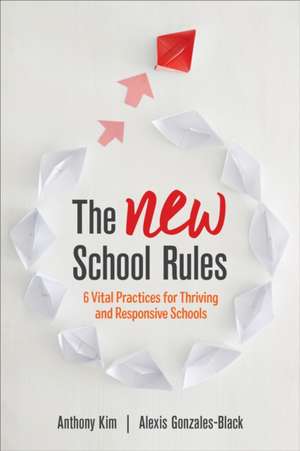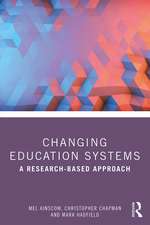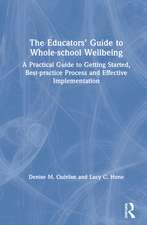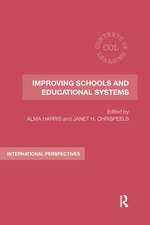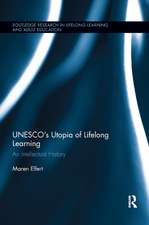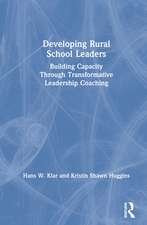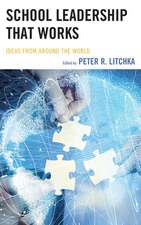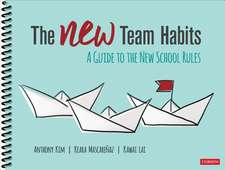The NEW School Rules: 6 Vital Practices for Thriving and Responsive Schools
Autor Anthony Kim, Alexis Gonzales-Blacken Limba Engleză Paperback – 18 apr 2018
Preț: 233.64 lei
Nou
44.71€ • 46.12$ • 37.31£
Carte disponibilă
Livrare economică 06-20 martie
Livrare express 19-25 februarie pentru 24.95 lei
Specificații
ISBN-10: 1506352766
Pagini: 216
Dimensiuni: 152 x 229 x 22 mm
Greutate: 0.34 kg
Ediția:1
Editura: SAGE Publications
Colecția Corwin
Locul publicării:Thousand Oaks, United States
Recenzii
The NEW School Rules is inspirational, easy to read, and realistic. It offers specific, doable steps to help you get started with implementation and make strides toward becoming part of a responsive organization. Ideal for an administrative team book study.
The NEW School Rules tackles organizational change in an interesting and accessible way with adaptable tools and protocols you’ll want to implement in your schools. The desired outcomes are clearly defined through an empathetic design approach.
Discussions about improving education inevitably gravitate to things—curriculum, standards, assessments, technology, professional learning. In The NEW School Rules, Anthony Kim and Alexis Gonzales-Black make a highly compelling case that to fundamentally improve education we must focus on process—specifically, the organizational management, structure, and practice that governs how decisions are made. The authors provide school administrators with an accessible how-to guide for implementing the kinds of organizational changes that will lead to real improvements in student outcomes.
When we take something as beautiful and life-giving as education, and find that managing the institutions that provide it is soul-crushing, we know something is very wrong. The NEW School Rules shows us the problem, offers an alternative vision of educational administration, and gives us the practical tools to unlock new energy in ourselves and our colleagues. Every administrator should read this book.
The NEW School Rules offers a critical and timely framework to ensure that future generations are equipped to thrive in a rapidly-changing world.
Super practical rules for school change with stated problems, lessons, and experiments you can try tomorrow. The NEW School Rules provides guidance on defining the work, encouraging experimentation, sharing leadership, accepting ambiguity, and turning schools into learning organizations. It is a must-read for leaders of teachers, schools, and systems.
Every school district should read and digest The NEW School Rules. In it, Anthony Kim and Alexis Gonzales-Black make a major contribution to how schools should create teams, organize, and plan to profoundly and positively impact students, teachers, and the community.
The NEW School Rules is a concrete, battle-tested roadmap for leaders who want to do right by kids by having the courage to help adults embrace change. As a superintendent of ten years (in Newark and New York), I led bold teams that were relentlessly focused on turning around systems that had been failing kids for decades. The central thesis of The NEW School Rules – that districts and schools must fundamentally rethink how they are organized in order to become more responsive, agile, innovative and, ultimately, effective – is spot on. What I appreciate most is that the book is both visionary and evocative – and also practical and instructive. We must build education institutions that put kids’ needs in an ever-evolving world ahead of everything else.
The NEW School Rules asks the right questions and poses the right experiments to shift districts and schools to an increased focus on student learning. Kim and Gonzales-Black combine smart practices for running a great organization with the realities faced in many of America’s schools. Preparing every student to succeed in the 21st Century requires that educators work collaboratively to increase the quality of education.
The NEW School Rules recognizes that adults in the educational system have to learn, evolve, and grow if students are to succeed in an ever-changing world. I wish I’d had this book years ago!
Cuprins
Acknowledgments
About the Authors
Introduction: Why We Need New Organizational Practices for Thriving Schools and Students Today
The Promise of Responsiveness
How Responsive Organizational Thinking Evolved
How This Book Is Designed
A Note About Who This Book Is For
CHAPTER 1. PLANNING: Plan for Change, Not Perfection
When Plans Are More Important Than Our Purpose
Planning Without Learning
Control Is Confused With Planning
Build Roadmaps, Not Manuals
Use Cadences and Pivot Points, Not Just Schedules and Deadlines
Encourage Testing, Experiments, and Responsiveness
EXPERIMENT 1. Define a Clear Purpose
EXPERIMENT 2. Delineate Between What You Know and What You Anticipate
CHAPTER 2. TEAMING: Build Trust and Allow Authority to Spread
We’re Dragged Down by the Slow and Unwieldy Legacy of Hierarchies
Land Grabs Are Still Too Common
When Everyone and No One Is Responsible
Clarify the Purpose of Every Team . . . and Revisit It
Build Trust and Address Tensions
Develop Effective Team Habits That Support Distributed Authority
Embrace Dynamic Team Structures That Evolve and End
EXPERIMENT 3. Offer Feedback as Data
EXPERIMENT 4. Team Meeting Protocol
CHAPTER 3. MANAGING ROLES: Define the Work Before You Define the People
Job Descriptions Get in the Way
Role Overwhelm (and Underwhelm)
Put a Role’s Purpose Before Politics
Separate Roles for Personal Clarity and Smarter Decisions
Value Each Voice as a Human Sensor
EXPERIMENT 5. Role Mapping
EXPERIMENT 6. The One-Question Technique
EXPERIMENT 7. Guidelines for Being an Effective Sensor
CHAPTER 4. DECISION MAKING: Aim for “Safe Enough to Try” Instead of Consensus
The Cycle of Meeting Paralysis
The Risks of Delayed Decision Making
The False Promise of Consensus . . . or Defaulting to a Decider-in-Chief
Get Aligned and Clear Out the Noise
Decide on Things You Can Decide On: Make Decisions Smaller
Fail Forward: Approach Planning and Big Decisions as Decision Cycles
EXPERIMENT 8. Three Language Shifts for Decision-Making Discussions
EXPERIMENT 9. Protocol for a Starting Proposal
EXPERIMENT 10. Default to Yes and Defend No—One Decision at a Time
CHAPTER 5. SHARING INFORMATION: Harness the Flow and Let Information Go
A False Sense of Transparency
Information Has an Expiration Date
Accept Ambiguity
Think of Others: Apply the Reverse Precautionary Principle
Ask for What You Need: Apply the Lesson of Self-Advocacy
Plan Communication as a Process, Not an Event
EXPERIMENT 11. Say “Thank You” for Asking
EXPERIMENT 12. The 3 × 3 Rule
CHAPTER 6. THE LEARNING ORGANIZATION: Schools Grow When People Grow
“Best Practices” Are Inhibiting Learning and Innovation
There Isn’t Learning Without Listening
The Mindset of Efficiency
Use the Physical Environment to Build a Learning Environment
Promote Optimal Zones of Learning (for Adults as Well, Not Just Kids)
Develop a Learning Mindset: The Stance of Agent, Not Subject
Face the Truth
EXPERIMENT 13. Start a Reflection Practice
EXPERIMENT 14. Create a Habit of Learning Every Day
EXPERIMENT 15. Personal Portfolios
A Responsive Roadmap: Beginning the Shift to New Organizational Practices
Three Dimensions of Change
A Plan for Implementation
Frequently Asked Questions and Answers
List of New Rules and Lessons
List of Experiments
References
Index
Notă biografică
Anthony Kim is a nationally recognized leader in education technology, school design, and personalized learning. As founder and CEO of Education Elements, he has been involved in helping hundreds of schools change the way they think about teaching and learning. As the author of ¿The Personalized Learning Playbook, Why the Time Is Now¿, Anthony has influenced many educators. He has contributed to many publications on new school models including ¿Lessons Learned from Blended Programs: Experiences and Recommendations from the Field¿. Anthony is a nationally recognized speaker on personalized learning and his work has been referenced by the Christensen Institute, iNACOL, EdSurge, CompetencyWorks, EdWeek, District Administrator, and numerous other research reports.
Anthony also founded Provost Systems, which provided online learning solutions to school districts. Provost Systems was acquired by EdisonLearning, where he served as Executive Vice President of Online. Anthony is passionate helping school district can become more nimble, understanding what motivates adult learners, and designing schools that plan for the needs of our future.
Outside of education, Anthony is passionate about triathlons and learning about people who overcome remarkable challenges. He is a San Francisco native and continues to live there with his wife Angela and rescued dogs.
